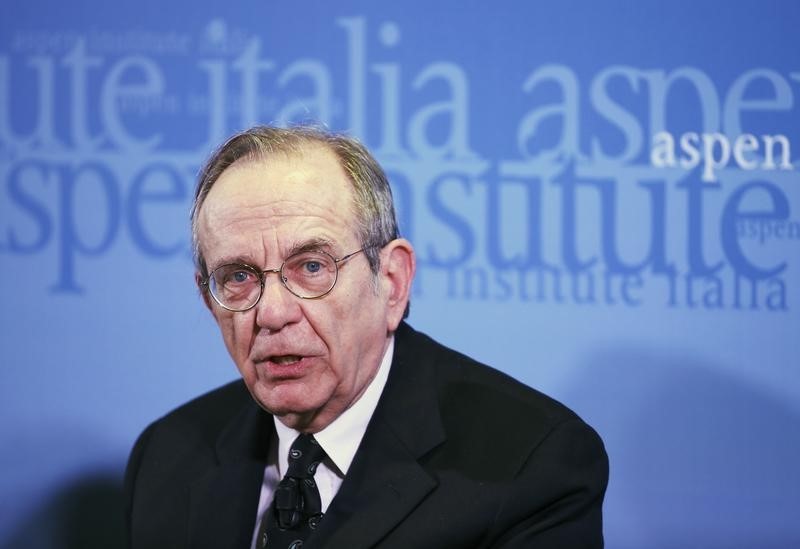By John Geddie and Marc Jones
LONDON (Reuters) - Europe is becoming "a bad word" due to the strains of the migrant crisis and growing inequality among euro zone countries that risk driving the continent apart, Italy's Economy Minister Pier Carlo Padoan said on Wednesday.
Speaking at an event hosted by the European Bank for Reconstruction and Development, which was set up 25 years ago after the fall of the Berlin Wall, Padoan said governments were not doing enough to tackle the region's big problems.
"In terms of language, in many cases let's face it, Europe is becoming a bad word and that is very serious," said Padoan.
With the euro zone struggling to shake off debt worries that have nearly split the currency bloc in recent years, Padoan said an even greater threat now came from the possible breakdown of Europe's borderless Schengen region as some countries introduce emergency controls to stem the movement of migrants.
"If Schengen fails, this is going to be much more destructive than a crisis of the euro zone," he said.
More than one million refugees and migrants entered Europe last year, many fleeing wars in the Middle East. Padoan said the crisis was "not a one-off shock" but "a major structural change that is going to be with us for a long time."
Border controls between Schengen countries are usually not allowed, but in a situation of emergency checks can be reintroduced for a maximum of two years.
ECONOMIC CHALLENGE
Heavily-indebted Italy has been lobbying the European Union for more fiscal leeway in its 2016 budget, both to help manage the influx of migrants and to keep a recovery in the euro zone's third-largest economy on track after three years of recession.
The EU Commission will rule on Italy's request this month.
France, Italy and Spain are set to miss EU budget targets this year and next without urgent government action, European Commission forecasts showed earlier this month.
Italy's debt, the second highest in the EU after Greece's, is expected to stay flat at 132.7 percent of national output this year after rising steadily in recent years.
Padoan lamented the uneven pace of reforms in the euro zone, saying this was making ultra-easy monetary policy from the European Central Bank less effective in fostering growth.
"In a monetary union, if speeds of reform are different then the impact of a single monetary policy is much less efficient because, by definition, if you strike the average you will make someone unhappy on one side and someone happy on the other side," Padoan said.
Padoan said a British vote to leave the EU in a June 23 referendum would be a systemic concern as other European countries could consider a similar move. 'Brexit' would also reduce the benefits of integration for the rest of the EU.

"The cost of Brexit outweighs the benefits," he added.